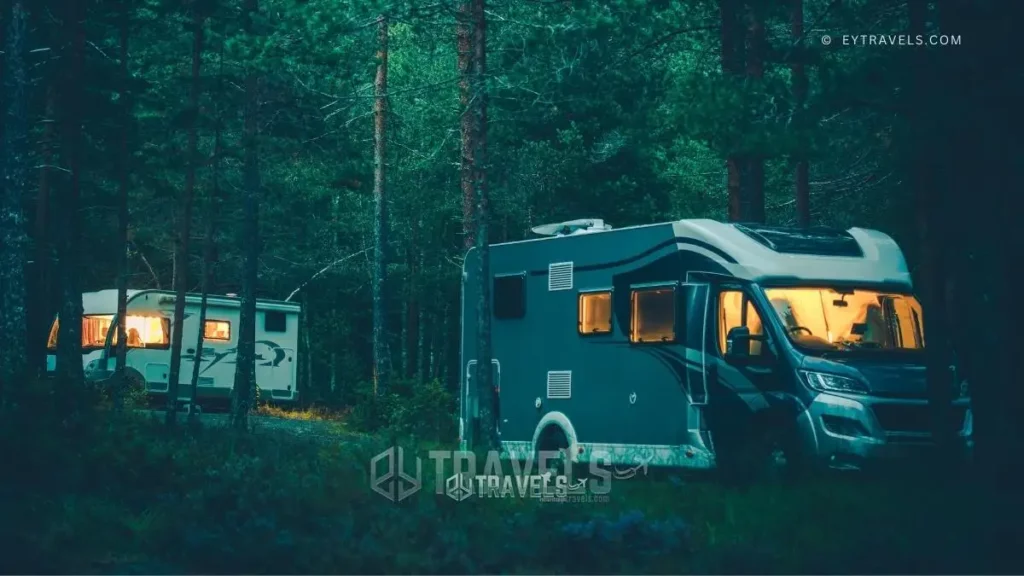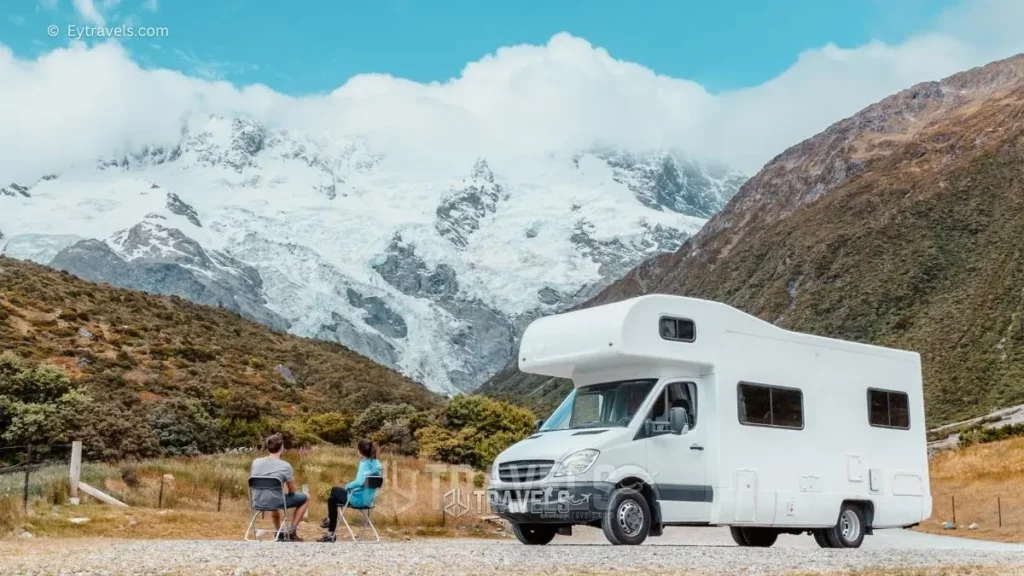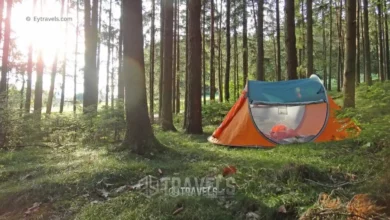Embark on an exploration of freedom as we delve into the world of boondocking in RVs—where spontaneity meets self-sufficiency. Whether you're an experienced RVer looking for a new challenge or a novice seeking an alternative to traditional campgrounds, this comprehensive guide will equip you with all the knowledge and skills needed to embrace this off-grid lifestyle with confidence.
So strap in, gear up, and get ready to discover everything there is to know about boondocking in RVs – your ticket to unparalleled adventures awaits!
Table Of Contents
- What is boondocking In RV and how does it work?
- Why should you try boondocking in your RV?
- How to find the perfect boondocking spot?
- Essential boondocking gear and equipment
- Boondocking tips and tricks for beginners
- Final Thoughts
- FAQs: What is boondocking in an RV?
- Q: What is the difference between boondocking and camping in a campground?
- Q: Where can I go boondocking in an RV?
- Q: Is boondocking legal?
- Q: How do I find boondocking or dispersed camping spots?
- Q: What are the different types of boondocking?
- Q: Do I need any special equipment for boondocking in an RV?
- Q: What are the advantages of boondocking in an RV?
- Q: How long can I stay boondocking in one place?
- Q: What should I consider when planning my first boondocking trip?
What is boondocking In RV and how does it work?
Boondocking, also known as dry camping or dispersed camping, is a popular way for RV owners to experience the great outdoors without the amenities and conveniences of traditional RV parks or campgrounds. It involves camping outside of designated campsites, often on public lands like Bureau of Land Management (BLM) areas or national forests. Boondocking allows RVers to enjoy the freedom and flexibility of camping without any hookups, offering a more adventurous and self-sufficient camping experience.
Definition of boondocking

Boondocking refers to camping without any hookups or amenities, such as water, electricity, or sewer connections. It involves parking your RV in a location that is not a designated campground or RV park, often in a remote or secluded area.
How does boondocking differ from traditional camping?
Boondocking differs from traditional camping in several ways. While traditional camping involves staying at developed campgrounds with designated campsites, boondocking allows campers to park their RVs in more remote locations without any amenities. Instead of paying for a camping spot, boondocking is typically free, offering a cost-effective alternative for RVers.
Is boondocking legal?
The legality of boondocking depends on the location. While boondocking is allowed on some public lands, such as BLM areas and national forests, it may be prohibited in certain areas or during specific seasons.
It's important to research and understand the regulations of the area you plan to boondock in to ensure you are camping legally. Websites and resources like the Bureau of Land Management and Forest Service can provide information on boondocking regulations and guidelines.
Why should you try boondocking in your RV?
Cost savings
One of the biggest advantages of boondocking is the cost savings. Instead of paying for a campsite or RV park, boondocking allows you to camp for free, reducing your travel expenses and making it an affordable option for budget-conscious RVers.
Closer to nature
Boondocking provides the opportunity to camp in more natural and scenic surroundings. By camping in remote locations away from the crowds, you can enjoy the peace and tranquility of the wilderness, listening to the sounds of nature and observing wildlife up close.
Freedom and flexibility
Boondocking offers RVers the freedom and flexibility to choose their camping spots and stay as long as they want. There are no reservations or check-in/check-out times to worry about, allowing you to explore and discover new destinations at your own pace.
How to find the perfect boondocking spot?
Using online resources

There are several online resources and apps that can help you find boondocking spots. Websites like Campendium and FreeCampsites provide comprehensive lists and reviews of free camping sites across the country. These resources often include valuable information about the amenities, accessibility, and reviews from other boondockers.
Exploring public lands
Public lands managed by agencies like the Bureau of Land Management and Forest Service often offer opportunities for boondocking. These lands provide vast areas for dispersed camping, away from the crowds and developed campgrounds. Researching and exploring these public lands can lead you to hidden gems and unique boondocking spots.
Talking to fellow RVers
Another way to find great boondocking spots is by networking with fellow RVers. Join online forums, social media groups, or attend RV meetups to connect with experienced boondockers who can share their favorite camping spots and offer valuable tips and advice.
Essential boondocking gear and equipment
Solar panels and alternative power sources
When boondocking, you won't have access to electrical hookups, so having alternative power sources is essential. Investing in solar panels for your RV can provide a sustainable and independent power supply, allowing you to recharge your batteries and run basic appliances.
Water conservation and storage
Conserving water is crucial when boondocking. Limited water supply means you'll need to be mindful of your usage and practice water-saving techniques. Equip your RV with water-saving fixtures and utilize portable water containers or tanks for additional water storage.
Camping essentials for off-grid living
When boondocking, you'll need to be self-sufficient and prepared for off-grid living. Make sure to pack essential camping gear such as a generator, camping stove, portable toilet, and a well-stocked first aid kit. These items will ensure your comfort and safety during your boondocking adventure.
Boondocking tips and tricks for beginners
Choosing the right RV for boondocking

Not all RVs are suitable for boondocking. When choosing an RV, look for features like larger holding tanks, solar-ready wiring, and good ground clearance for off-road adventures. Consider the size and weight of your RV to ensure it's compatible with the boondocking sites you plan to visit.
Planning your boondocking trip
Proper trip planning is essential for a successful boondocking experience. Research the area you plan to visit, including weather conditions, road accessibility, and nearby amenities or attractions. Plan for backup options in case your chosen boondocking spot is unavailable or unsuitable.
Managing waste and sanitation
When boondocking, you'll need to manage your waste and sanitation responsibly. Dispose of garbage properly, utilize dump stations when available, and follow Leave No Trace principles to minimize your impact on the environment. Practice good hygiene and bring eco-friendly products for personal care.
Final Thoughts
In short, boondocking in an RV offers a unique and adventurous way to experience the great outdoors. It allows travelers to explore remote and beautiful locations while enjoying the freedom of off-grid living. With the right preparation and knowledge, boondocking can be a rewarding and sustainable way to travel.
By following the tips and guidelines outlined in this guide, you'll be well-equipped to embark on your own boondocking adventures with confidence. So, pack up your RV, embrace the spirit of adventure, and start exploring the world of boondocking today!
FAQs: What is boondocking in an RV?
A: Boondocking in an RV refers to camping in remote or undeveloped areas without any electrical, water, or sewer hookups. It is also known as dry camping or dispersed camping.
Q: What is the difference between boondocking and camping in a campground?
A: The main difference between boondocking and camping in a campground is the level of amenities and services available. In a campground, you have access to electricity, water, and sewer hookups, as well as facilities like restrooms and showers. Boondocking, on the other hand, involves camping in remote areas with no hookups or facilities.
Q: Where can I go boondocking in an RV?
A: You can go boondocking in an RV in various locations, such as national forests, Bureau of Land Management (BLM) lands, and some state parks. These areas often allow dispersed camping, which means you can camp at undeveloped sites for free or a small fee.
Q: Is boondocking legal?
A: Boondocking is legal in designated areas that permit dispersed camping. However, it's important to research and follow the specific rules and regulations of the area you plan to camp in.
Q: How do I find boondocking or dispersed camping spots?
A: There are several ways to find boondocking or dispersed camping spots. You can use websites and apps that specialize in locating these areas, such as Campendium, FreeRoam, or AllStays. Additionally, you can find information from national forest websites, BLM offices, or local visitor centers.
Q: What are the different types of boondocking?
A: There are various types of boondocking, including overnight parking in places like Walmart parking lots or truck stops, camping on public lands, or finding unique camping spots off-the-grid.
Q: Do I need any special equipment for boondocking in an RV?
A: While you don't necessarily need any special equipment, there are a few things that can enhance your boondocking experience. These may include solar panels to charge your batteries, a generator for power backup, and extra water storage containers.
Q: What are the advantages of boondocking in an RV?
A: There are several advantages to boondocking in an RV. It allows you to connect with nature and experience remote and scenic locations. It also provides a sense of freedom and flexibility, as you can choose your own camping spot and stay for longer periods without the need for reservations.
Q: How long can I stay boondocking in one place?
A: The duration of your boondocking stay will depend on the specific regulations of the area you're camping in. Some places may have restrictions on the length of stay, whereas others may allow you to camp for extended periods.
Q: What should I consider when planning my first boondocking trip?
A: When planning your first boondocking trip, it's important to consider factors such as finding a suitable camping spot, ensuring you have enough water and power, packing necessary supplies, and understanding the local rules and regulations. It's also a good idea to start with shorter trips to become familiar with the boondocking lifestyle.






